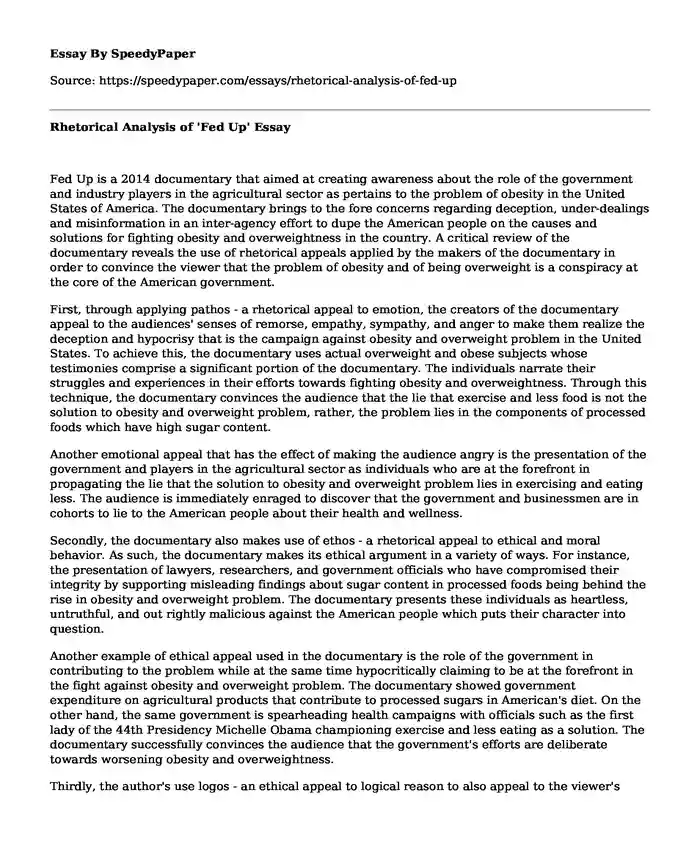
| Essay type: | Rhetorical analysis essays |
| Categories: | Education Business Society |
| Pages: | 4 |
| Wordcount: | 848 words |
Fed Up is a 2014 documentary that aimed at creating awareness about the role of the government and industry players in the agricultural sector as pertains to the problem of obesity in the United States of America. The documentary brings to the fore concerns regarding deception, under-dealings and misinformation in an inter-agency effort to dupe the American people on the causes and solutions for fighting obesity and overweightness in the country. A critical review of the documentary reveals the use of rhetorical appeals applied by the makers of the documentary in order to convince the viewer that the problem of obesity and of being overweight is a conspiracy at the core of the American government.
First, through applying pathos - a rhetorical appeal to emotion, the creators of the documentary appeal to the audiences' senses of remorse, empathy, sympathy, and anger to make them realize the deception and hypocrisy that is the campaign against obesity and overweight problem in the United States. To achieve this, the documentary uses actual overweight and obese subjects whose testimonies comprise a significant portion of the documentary. The individuals narrate their struggles and experiences in their efforts towards fighting obesity and overweightness. Through this technique, the documentary convinces the audience that the lie that exercise and less food is not the solution to obesity and overweight problem, rather, the problem lies in the components of processed foods which have high sugar content.
Another emotional appeal that has the effect of making the audience angry is the presentation of the government and players in the agricultural sector as individuals who are at the forefront in propagating the lie that the solution to obesity and overweight problem lies in exercising and eating less. The audience is immediately enraged to discover that the government and businessmen are in cohorts to lie to the American people about their health and wellness.
Secondly, the documentary also makes use of ethos - a rhetorical appeal to ethical and moral behavior. As such, the documentary makes its ethical argument in a variety of ways. For instance, the presentation of lawyers, researchers, and government officials who have compromised their integrity by supporting misleading findings about sugar content in processed foods being behind the rise in obesity and overweight problem. The documentary presents these individuals as heartless, untruthful, and out rightly malicious against the American people which puts their character into question.
Another example of ethical appeal used in the documentary is the role of the government in contributing to the problem while at the same time hypocritically claiming to be at the forefront in the fight against obesity and overweight problem. The documentary showed government expenditure on agricultural products that contribute to processed sugars in American's diet. On the other hand, the same government is spearheading health campaigns with officials such as the first lady of the 44th Presidency Michelle Obama championing exercise and less eating as a solution. The documentary successfully convinces the audience that the government's efforts are deliberate towards worsening obesity and overweightness.
Thirdly, the author's use logos - an ethical appeal to logical reason to also appeal to the viewer's sense of critical thinking towards creating empathy and reason for the dilemma that is the overweight and obesity problem. To achieve this end, the authors present the accounts of various obese people and their struggles to lose weight. As such, the documentary proves without a doubt that exercise and eating less is not the solution to the overweight problem. Moreover, by presenting facts and statistics that support the conclusion that obesity and overweight problem is a recent problem, the documentary proves that it was created by the government in cohorts with the agricultural business people for purposes of profit.
In addition, logical reason is also supported by the presentation of scientific evidence from experts that shows how sugar content in the foods taken by Americans is the sole cause of obesity and overweight challenge. The documentary presents facts through comparison of calories taken and lost through exercise as well as comparison of natural foods against processed foods. The facts presented provide adequate proof that obesity and overweight problem in the United States is caused primarily by the consumption of processed foods.
In essence, the documentary does a complete and thorough review of the obesity and overweight problem in the United States and presents astonishing revelations regarding the nature of the deception, misinformation, collusion, and manipulation of the American people and their health. Through rhetorical appeals pathos, logos, and ethos, the documentary presents a compelling argument for the position that obesity and overweight challenge is one that can be addressed by simply eating natural foods devoid of processed sugars. Through the presentation of facts, proof, and evidences, the documentary successfully appeals to logic and reason of the viewer. Equally, through the use of rhetorical appeal pathos, the documentary has appealed to the viewers' emotions in convincing the viewer of the true cause of the problem. Similarly, ethos was used through the evaluation of characters of experts in government and industry who misinformed the public on the issue as discussed.
Cite this page
Rhetorical Analysis of 'Fed Up'. (2022, Dec 16). Retrieved from https://speedypaper.com/essays/rhetorical-analysis-of-fed-up
Request Removal
If you are the original author of this essay and no longer wish to have it published on the SpeedyPaper website, please click below to request its removal:
- Free Essay Example on Project Manager Duties
- Essay Sample on the Perspectives on Sex Addiction
- Free Essay Example: Administrative Policy for Tesla, Inc. Consulting Letter
- SDLC Methodologies Essay Sample
- Antinatalism in a Philosophy Essay Sample
- Free Literary Essay on Ernest Hemingway's Nick Adams' Stories
- Essay Example on Audit Planning and Control of General Motors
Popular categories




